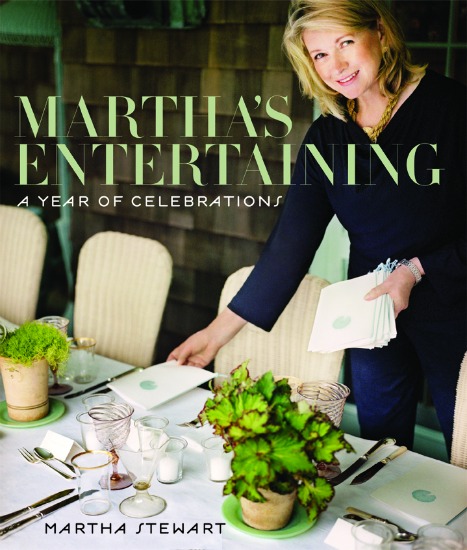Martha Stewart Entertains at the Smithsonian
Marc Pachter, of the NMAH, will be interviewing the queen of domesticity this Thursday night. But we had a few words with her first
/https://tf-cmsv2-smithsonianmag-media.s3.amazonaws.com/filer/16/06/1606719f-d08c-4ad5-b0ee-adc0908d2cd0/martha_stewart_2011_shankbone.jpeg)
Nearly 30 years ago, a caterer named Martha Stewart published her first cookbook, Entertaining. The bestseller became the template for hosting get-togethers of all kinds—cocktail parties to clam bakes, omelette brunches to Chinese banquets, Thanksgiving dinners and Christmas open houses, even at-home weddings. Needless to say, it launched Stewart’s career.
This Thursday night (7 p.m. at DAR Constitution Hall in Washington, D.C.), Marc Pachter, interim director of the National Museum of American History, will be sitting down with the author, entrepreneur, magazine publisher, television host and all-around doyenne of domesticity to discuss the evolution of American domestic culture and her profound impact on it. The program, hosted by the Smithsonian Associates, is in timing with the recent release of her latest book, Martha’s Entertaining: A Year of Celebrations—an update to her inaugural book. I spoke with Stewart, by phone, in advance of the event:
First of all, how would you describe the role you have played in the evolution of American domestic culture?
It wasn’t planned, but what’s happened, what actually occurred, was that the role of the champion of the homekeeping arts became mine. And, pleasantly, so. It has been wonderful for the last 30 years to be considered a teacher, a mentor and an important force in promoting the domestic arts as an art form rather than a chore.
Martha Stewart will give a presentation on entertaining in the home and sign copies of her latest book. Image courtesy of the Susan Magrino Agency.
What is the most dramatic way in which domestic culture has changed in America in the last three decades?
I think really what’s happened is that so many people are taking pride in their homes, more pride than they had before. I think what we have done is make the home more important in terms of a place where you can express yourself personally, where you can entertain, where you can decorate, where you can garden with style and with knowledge. And, we have been providers of the style, of the knowledge, of the information and the inspiration.
You have had such a huge impact on domestic culture—to the point that if someone is really crafty and skilled at entertaining and decorating, she is often called a “Martha Stewart.” To you, what does it mean to be a “Martha Stewart?”
Well, it means someone who is interested in actually enjoying life in a more intellectual way. Intellectual, not hoighty-toighty, but in a celebratory way.
In your new book Martha’s Entertaining, you have a section devoted to breakfast trays. And, you admit that the idea of breakfast served in bed is old fashioned. But, I wonder, are there any other domestic traditions you mourn the loss of?
There are kind of a lot of them. One of them is the family meal. Sitting down at the table for the family dinner every night has really become a thing of the past. Most homes do not have that. I think people don’t even realize how good it was. We always sat down. There were eight of us, and we sat down. It took awhile. It took 18 years for there to be eight of us. My mom had babies over a period of 18 years. But when we all sat down, we talked. We had a conversation. The parents actually led the conversation. And, I don’t remember it being anything but a pleasant experience. I am sure there were arguments and stuff, but I don’t remember it as anything but interesting. That doesn’t exist anymore, because of school schedules, work schedules, travel schedules, sports schedules. Sports teams and the avid nature of high school sports really kind of took away from all of that.
When does sticking to tradition become a bad thing?
If it becomes boring. If it becomes rote. If it becomes totally unchanged. I mean, you have to evolve. Just as technology has evolved, traditions evolve. I think when you look through the pages of the new entertaining book, you can see big elements of change in my style. I certainly change from year to year over the 30 years. My Christmas now looks pretty different from what it used to look like, but there are still inklings of the old traditions within the new.
In your new book, you say, “entertaining guests is not really about ‘shortcuts.’” But pulling off a multi-course meal or a cocktail party requires a certain level of efficiency. As a career woman, isn’t there a shortcut that you would endorse?
Oh, I mean, you learn the shortcuts along the way. I used to bake all my bread. I don’t bake my bread anymore, unless I am trying out bread recipes. I know where to get the very, very best breads. I also am able to, thank heavens, have help now. When I wrote the first Entertaining book, I didn’t have any help. Now, I have much more help.
At the event, Martha Stewart will also be giving a presentation on entertaining in the home and signing copies of Martha’s Entertaining. For ticket information, visit the Smithsonian Associates’ website.
/https://tf-cmsv2-smithsonianmag-media.s3.amazonaws.com/accounts/headshot/megan.png)

/https://tf-cmsv2-smithsonianmag-media.s3.amazonaws.com/accounts/headshot/megan.png)